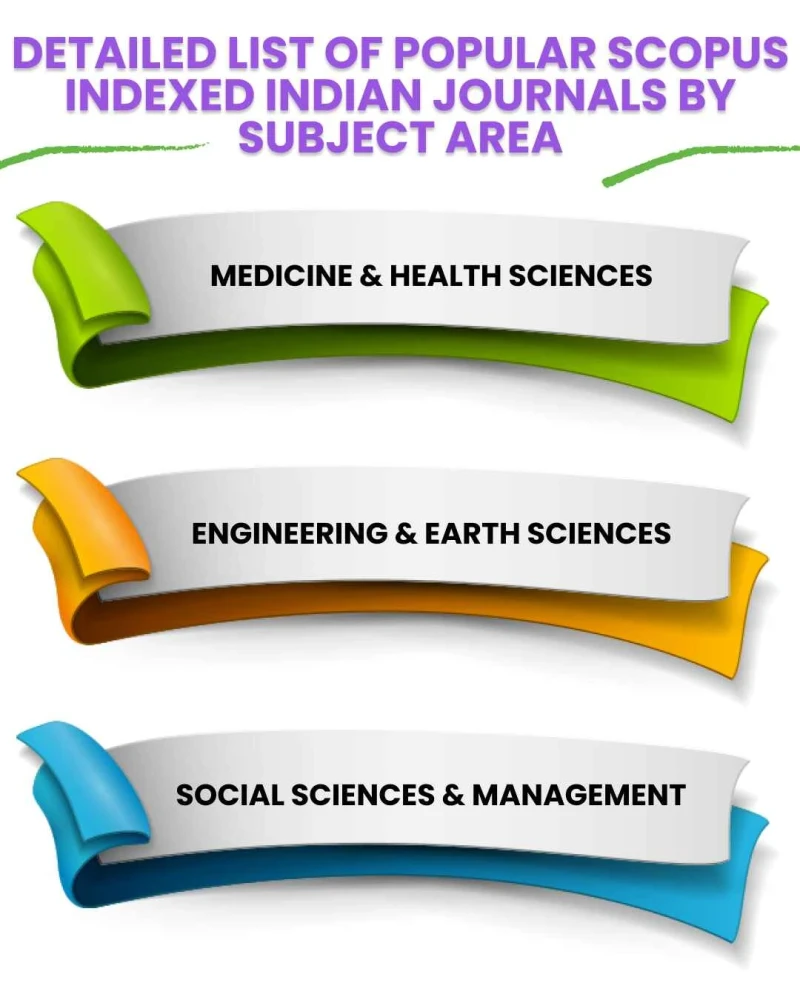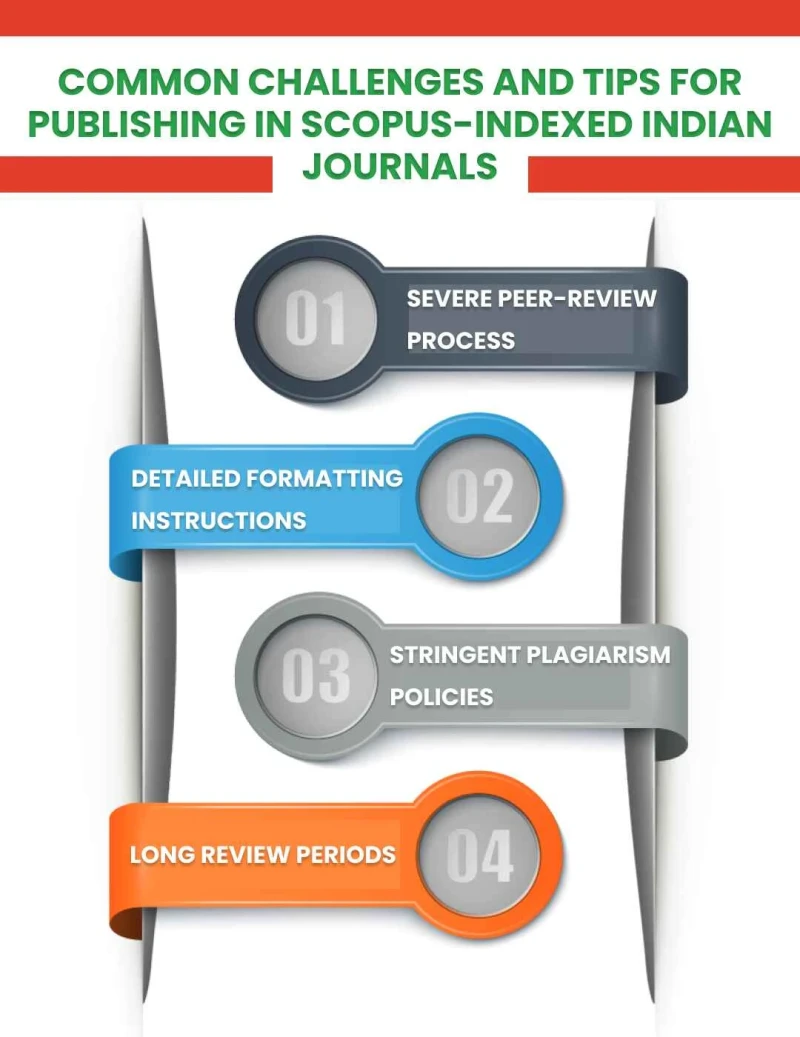Methods of Primary Data Collection in Research Methodology
Master the top methods of primary data collection in research methodology. Learn to use surveys, interviews, and experiments to gather original, high-quality data.

Esther. F
Scopus-indexed Indian journals are highly sought after in the academic circle for their authenticity, quality, and global status. Scopus is a subsidiary of Elsevier and is one of the largest abstract and citation databases, with coverage of peer-reviewed material in the majority of subjects.
For academics, publication in these Scopus-indexed Indian journals not only enhances the value of their research but also raises the credibility of academics and their careers.
Scopus is important in academic publishing because it provides a reliable platform which indexes only reputable journals that meet strict assessment criteria. This way, work published can be seen by more people and be sustainable for use in citations, grants, and academic progress.
In this blog, we are only emphasising Scopus-indexed Indian journals, giving researchers advice about how they are important and how they can be a passport to academic achievement all over the world.
You may be a student, a teacher, or an individual researcher; the proper choice of a Scopus-indexed journal can be the turning point in your research career.
Scopus is the largest abstract and citation database of peer-reviewed journals, books, and conference proceedings in the world. Controlled by Elsevier, it is a reliable academic journal indexing source covering various disciplines.
To be indexed, a journal must fulfil stringent criteria like a sound peer-review process, ethical publishing, and a regular publication record. These criteria ensure that only high-quality and authentic sources get to be "Scopus indexed.
Publication in a Scopus-indexed or high-impact journal provides many advantages to researchers. It enhances research visibility globally, enhances the chances of citation, and ensures quality assurance with tough scrutiny.
To Indian researchers, it provides avenues for international recognition, academic collaborations worldwide, and improved career prospects.
Indian journals listed in Scopus deal with a vast array of disciplines, which can help researchers easily identify the appropriate journal to publish research papers in areas such as medicine, engineering, social sciences, agriculture, and environmental studies.
Over the years, Indian journals have increasingly appeared in international databases, indicating better quality, editorial standards, and global applicability.
As per Scopus data, there are hundreds of active indexed journals in various subject categories in India. Prominent ones with Q1/Q2 rankings are the Indian Journal of Medical Research (Medicine), the Journal of Earth System Science (Earth Sciences), Sādhanā – Academy Proceedings in Engineering Sciences (Engineering), Economic and Political Weekly (Social Sciences), and the Indian Journal of Pharmaceutical Sciences (Pharmacy).
This variety not only augments India's research profile but also provides scholars from diverse fields with authentic platforms to showcase their work globally.

Below is a categorised overview of prominent journals to publish research papers in various major disciplines, helping researchers quickly identify suitable platforms.
Publisher: Indian Council of Medical Research
ISSN: 0971-5916
Quartile: Q2 (based on general ranking trends for Indian medical journals) milliyasrcollege.org
Scope: Broad-spectrum clinical and biomedical research with a national and international audience.
Publisher: SAGE Publishing (for Indian Psychiatric Society, South Zonal Branch)
ISSN: 0253-7176 (print), 0975-1564 (online)
Quartile: Likely Q2, given its impact factor (~1.9 in 2023) Wikipedia
Scope: Clinical psychiatry and mental health research aimed at psychiatrists and psychologists.
Publisher: OMICS International (on behalf of the Indian Pharmaceutical Association)
ISSN: 0250-474X (print), 1998-3743 (online)
Quartile: Q2 approximation, based on impact data from 2015–2019 Wikipedia
Scope: Covers pharmaceutics, pharmacology, pharmaceutical chemistry, and clinical pharmacy.
Publisher: Springer India (Indian Academy of Sciences)
ISSN: 0256-2499 (print), 0973-7677 (online)
Quartile: Likely Q2–Q3, given engineering journal norms milliyasrcollege.org
Scope: General engineering topics including applied, theoretical, and interdisciplinary work.
Publisher: Indian Academy of Sciences
ISSN: 2347-4327, 0973-774X
Quartile: Likely Q2, based on relevance and editorial standards milliyasrcollege.org
Scope: Interdisciplinary earth sciences: climate, geology, atmospheric systems.
Publisher: Sameeksha Trust
ISSN: 0012-9976
Quartile: Typically Q1 for social sciences in South Asia, though exact ranking not specified here.
Vikalpa: The Journal for Decision Makers
Publisher: SAGE Publishing (on behalf of IIM Ahmedabad)
ISSN: 0256-0909 (print), 2395-3799 (online)
Quartile: Likely Q2, due to its management focus, Wikipedia
Scope: Strategic management, executive decision-making, and leadership practices.
Publisher: SAGE India (with Institute of Rural Management Anand)
ISSN: 0973-0052 (print), 0973-0680 (online)
Quartile: Likely Q2, given its niche but respected scope, Wikipedia
Scope: Management of rural enterprises and community-based organisations.
The ideal way to verify Scopus-indexed journals is on the official Scopus website or the Scopus Journal Finder. Also, the PhDTalks Journal Finder can be an apt and free guide to validate Indian journals before submission.
Steps to Authenticate and Avoid Predatory Journals:
Visit the Scopus Sources page and search based on journal name or ISSN.
Utilise the Scopus Journal Finder to identify corresponding indexed journals for your paper.
Check current country and subject listings on the PhDTalks Journal Finder.
Check publisher details, years covered, and quartile ranking on Scopus directly.
Avoid red flags: mismatched ISSNs, ghost metrics, boilerplate "Scopus listed" claims, and suspiciously swift claims of acceptance.
Publication in Scopus-indexed Indian journals confers considerable advantages, such as a greater academic profile, higher opportunities for procuring research grants, and better opportunities for career advancement.
A Scopus-indexed publication is often a prerequisite at many universities and institutions for faculty promotion, PhD assessment, and grant sanction.
To early-career scholars, these journals offer international visibility combined with the regional focus of addressing India-specific concerns. Some Indian journals are also likely to provide shorter publication timelines than their international equivalents, so researchers can circulate their work more quickly.

Scopus-indexed journals enforce strict peer-review processes, where experts in the field review your manuscript for originality, research depth, and contribution to the field. Inadvertent mistakes in methodology or data interpretation are enough to get your paper rejected or require significant revisions.
Each journal comes with a style guide for citation styles, figure and table formatting, abstract arrangement, and word limit. Inattention to these details can hold up the review or result in straight desk rejection.
Such journals simply have no tolerance for any unethical behaviour. Even accidental similarity or incorrect paraphrasing may result in rejection of the manuscript. This also involves self-plagiarism, i.e., reusing your own old published material without an accurate citation.
With the large number of submissions and rigorous evaluation processes, several weeks to months are taken for reviews. This can be problematic if you have deadline work for submission of a thesis, grant proposals, or promotion requirements.
We offer end-to-end academic support services, including journal selection guidance, manuscript editing, plagiarism checking, and submission assistance. Our team has expertise in helping researchers meet the high standards of reputed journals, ensuring your work stands out.
Choosing the right Scopus-indexed Indian Journal is crucial for improving acceptance chances. We assess your manuscript’s topic, methodology, and scope to recommend journals that match your field, target audience, and quartile ranking preferences. This ensures you submit to publications most likely to appreciate and accept your work.
Our editors refine your paper for clarity, grammar, flow, and technical accuracy. We also ensure it follows the journal’s formatting guidelines, such as citation style, figure and table presentation, and abstract structure, so your submission meets professional publishing standards.
We run your manuscript through trusted plagiarism detection tools like iThenticate or Turnitin to ensure originality. This process helps identify accidental similarities, self-plagiarism, or citation gaps, allowing you to address them before submission.
From creating a polished cover letter to uploading the correct files in the submission portal, we guide you through every step. We ensure that all metadata, author details, and supplementary files are complete and error-free, minimising delays in the review process.
Ready to get published? Contact us today for personalised guidance for Scopus indexed journals and take the next step toward your academic success.
Publication in Scopus-indexed Indian journals is an effective means to enhance academic legitimacy, international visibility, and institutional demands. By being very deliberate in choosing the appropriate journal, adhering to ethical and formatting standards, and getting expert advice when necessary, one enhances the prospects of success. Remain focused on quality research and treat every publication as a step towards a successful academic career.
Master the top methods of primary data collection in research methodology. Learn to use surveys, interviews, and experiments to gather original, high-quality data.
Don’t write your methodology without reading this. Learn why purposive sampling is essential for case studies and how to define your inclusion criteria. Url:purposive-sampling
Master the chapterization of thesis to ensure logical flow. Learn the standard academic framework for organizing research into a professional, approved document.
A practical guide to sentiment analysis research papers covering methodologies, datasets, evaluation metrics, research gaps, and publication strategies.
Master data analysis for research papers. Learn quantitative and qualitative methods, cleaning, and reporting standards to ensure your study meets journal rigour.
Want to impress your peers? Discover the best ways to condense your research, avoid common mistakes, and handle tough questions at any academic conference.